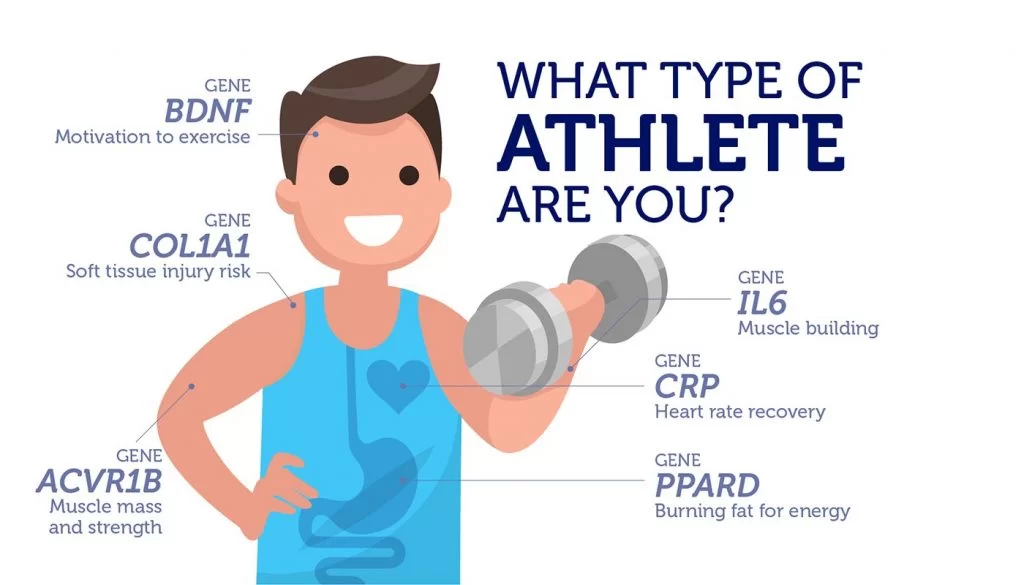
SPORT DNA TEST
Your individualized Sport Report will provide an explanation of how your genetic profile may impact your training and or nutritional requirements. Certain genetic variants are advantageous for athletic performance, while some variants may contribute to an increased risk for injury or delayed recovery time.
Some individuals recover quickly from exercise and are ready to train hard again after just a day’s rest, whereas some individuals don’t seem to ‘bounce back’ from hard sessions quite so quickly and need a longer break between intense training sessions.
Delayed recovery or increased susceptibility to injury means that a balanced, personalized, and well-managed training program is required, with a strong emphasis on recovery strategies, conditioning exercise, and nutrition. A specific training regimen with volumes and intensities will be provided in your Sport Report along with your optimal time for recovery between sessions. Nutritional, dietary and supplemental recommendations will also be provided, with any additional health recommendations.
With regards to injury and recovery, three important biological systems have been well researched and are examined in the Sport Test:
- Inflammation
- Injury Susceptibility (Connective Tissue Remodeling)
- Oxidative Stress
Certain genetic factors, as examined in your DNA Sport test, can also determine how well you will respond to certain types of exercise training. Although both aerobic training as well as strength and weight training are important for overall health and fitness, the ratio of these types of training should vary between individuals, even between those working towards the same goals. The overall results of this genetic test will enable you to focus your training on the type of exercise that is going to give you the best outcomes for your hard work, whether that be aerobic or power type training.
With regards to performance, four important biological systems have been well researched and are examined in the Sport Test:
- Blood Flow and Respiration
- Energy Mobilization
- Fuel Metabolism
- Musculoskeletal Properties
Inflammation
Inflammation is a normal immune response and an essential and part of tissue healing following exercise. The release of inflammatory cytokines is controlled by various genes, however, when there is greater than normal increase in inflammatory cytokines following exercise, or a prolonged increase in these cytokines, increased recovery time is required between hard sessions in order to avoid tissue damage.
The inflammation Sport genetic panel will examine if you experience post-experience inflammation, or if you experience improved muscle repair after eccentric exercise.
Your report will discuss if you have an advantage for strength and power training, and if adding eccentric loading to your training regimen may be beneficial to power development.
Your report will also disclose the best intensity of exercise that is right for you, if you require an increase in recovery time between training bouts, and which nutritional choices are favorable to you.
Injury Susceptibility
Multiple stimuli, including exercise and mechanical load, can lead to connective tissue remodeling. Although remodeling may lead to physical gains, alterations in the structural properties of tissues may also lead to increased injury susceptibility. The variations examined in the DNA Sport test are linked to the ability of soft tissues to repair and remodel following tissue degradation, thus being implicated in injury risk.
The Injury Susceptibility panel of the Sports Test will reveal if you are at increased risk for injury due to a genetic contribution that leads to a structural change in the properties of your tissue.
Based on your genetic profile, you may also have a moderately increased risk for tendon and ligament injuries. Base strength, conditioning, flexibility training, and nutritional intervention will be important parts of the recommendations that will be provided for injury prevention.
Oxidative Stress
Free radicals are a normal by-product of the biological processes that generate energy, such as those that occur during exercise. They are highly reactive with other molecules and can damage DNA, proteins and cellular membranes. Antioxidants are free radical scavengers that interact with the free radical to ensure that it is no longer a reactive molecule.
The Oxidative Stress genetic panel of the Sports Report will provide information regarding the length and intensity of exercise that will lead to an increase in antioxidant enzymes, as well as a decrease in baseline inflammatory cytokines specific to you and beneficial to your exercise training, performance, and optimal health. Your report will also provide specific dietary recommendations and indicate if antioxidant supplementation, such as with omega 3 fatty acids, is recommended to reduce muscular fatigue and for your optimal health.
Performance
It is well established that a high percentage of the variance observed in athletic status can be explained by genetic factors. These genetic factors, as examined in your DNA Sport test, can determine how well you will respond to certain types of exercise training. Although both aerobic training as well as strength and weight training are important for overall health and fitness, the ratio of these types of training should vary between individuals, even between those working towards the same goals. The overall results of this genetic test will enable you to focus your training on the type of exercise that is going to give you the best outcomes for your hard work, whether that be aerobic or power type training.
Blood Flow and Respiration
Sporting performance is largely dependent on oxygen diffusion, and thus the vascular and pulmonary systems. Oxygen transport to the musculature is the key determinant of aerobic capacity and resistance to fatigue. The Blood Flow and Respiration genetic panel in your Sports Report will provide information on your aerobic capacity, aerobic training requirements, and the level of repetitive weight training that will specifically lead to increased muscle efficiency, muscular strength, and lean body mass. This panel will also provide results of your individual salt sensitivity and indications if your salt intake should be monitored in order to avoid potential blood pressure spikes.
Energy Mobilization
In order to avoid fatigue during exercise, the rate of energy production needs to match the rate of energy consumption. The mitochondria are the key sites of energy production (in the form of ATP) for muscle fibers, and the oxidative capacity of muscle fibers is directly linked to the formation of new mitochondria. The Energy Mobilization panel of your Sport Report will reveal if you have a greater percentage of muscle fibers and if mitochondrial biogenesis and aerobic performance can be heightened by training and caloric restriction.
Fuel Metabolism
Carbohydrates and fats are the main contributors to the fuel supply that is necessary to perform the exercise. These sources are converted to energy, in the form of ATP, when required. Protein is generally involved in the maintenance and remodeling of tissues rather than an energy source to fuel muscles. The Fuel Metabolism panel of your Sport Report will reveal if you are a fast or slow metabolizer of caffeine. Caffeine is a central nervous system and metabolic stimulant used to reduce physical fatigue. In athletics, moderate doses of caffeine have been known to improve both sprint and endurance performance.
Your report will indicate if you will benefit from taking caffeine at a specific time before or during workouts. If your Sport Report indicates health implications, recommendations will be made on how best to limit caffeine consumption. This genetic panel will also determine if you have the ability to lose weight as a result of higher aerobic activity. This report will provide a comprehensive understanding of your weight loss responsiveness to exercise.
If your Sports Report indicates health implications, recommendations will be made.
Your Athletic Potential
Remember that many variables influence your success with regards to training and performance; genetics is one of these variables that should be used to understand the total outcome.
Musculoskeletal Properties
The properties of the musculoskeletal system, including bones, muscles, cartilage, tendons, ligaments, and joints, greatly affect our ability to perform. Although these issues can be potentially altered with training, our genetics form the basis of the structural properties of these tissues.
